Writer, blogger and self proclaimed word-nerd Harriet Allner, presents the first in a series of special posts for Death & the Maiden that explore death in literature. This week’s novels take various questions about human life and death, exploring them in interesting, challenging ways. Examining how we construct horrors and hopes around dying, how we use story to sooth our anxieties and investigate our fascinations with the deceased.

– Harriet Allner –
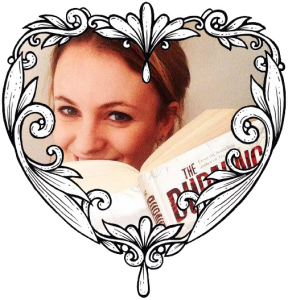
Harriet is a writer, blogger and general word-nerd working in fintech, with a penchant for setting up shop as a reader-in-residence.
Having studied philosophy and literature at Edinburgh University, she went on complete her Masters at Durham where she had the chance to investigate the relationship between neuroscience and books, in particular the rise of the neuronovel and Extended Mind Theory. A central part of this looked at the relationship between our minds, technology, literature and the Uncanny, and how we understand the boundaries of skin and skull.
Thus, from technology and brains to all things curious and (of course) bookish, Harriet tends to write about things that interest her rather than anything specific and is a big believer in multidisciplinary study and multipotential lives.
Twitter: @TheScribbleBug
Instagram: @thescribblebug
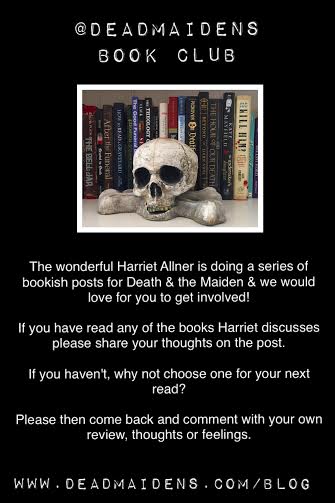
When it comes to trying to make sense of death, dying, grief and loss, many revert to telling stories.
A fundamental human act, stories give us ways of understanding that which is beyond us, methods to cope and heal. No doubt contributing to why there are so many novels out there dealing with these subjects.
Whether it’s thinly veiled existentialism, fear of the unknown, curiosity about possible afterlives, or a need to make sense of a life lost but loved – literature navigates the big questions surrounding our mortality.
The novels I’ve included on this list are ones that take various questions about human life and death and explore them in interesting, challenging ways.
They’re not all books that everyone will love.
They’re not even all books that I love.
But they are books exploring our relationship with death – how we construct horrors and hopes around dying, how we use story to sooth our anxieties and investigate our fascinations with the deceased.
Any thoughts?
Any novels you would love to add to the list?
Leave your thoughts in the comments below.
1. More Than This by Patrick Ness
“I wanted so badly for there to be more. I ached for there to be more than my crappy little life.’ He shakes his head. ‘And there was more. I just couldn’t see it.”
‘A boy drowns, desperate and alone in his final moments. He dies. Then he wakes, bruised and thirsty, but alive.’ This was the synopsis that drew me in, moth to a flame. And I wasn’t disappointed. Patrick Ness’s More Than This delivers a brainpunch like no other and it’s centred around that question of what happens next, whether there’s more to death than the grave, how death might affect the dead as well as the living. I don’t want to give too much away because it’s absolutely one to read for yourself but take this: It’s an existentialist exploration like no other. Deeply humanistic, undeniably solipsistic, Ness spends most of the novel challenging our readerly expectations about life and death. Despite being billed as a YA novel, the best description I think is probably that it’s ‘an aftermath novel, an afterlife novel, an afterlove novel, and afterloss novel’. More Than This is one of the cleverest books you will read exploring death, what we can or cannot know, and whether it matters either way.
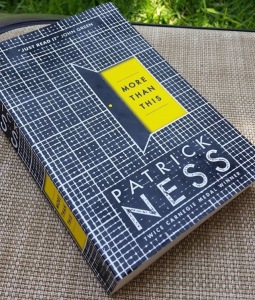
2. Big Fish: A Novel of Mythic Proportions by Daniel Wallace
“This is what is meant by last words. They are keys to unlock the afterlife. They’re not last words, but passwords, and as soon as they are spoken you can go.”
When it comes to ‘final journeys’ perhaps there is none so peculiar, humourous and charming as that of the fairytale-epic, Big Fish. Many of you might have heard of this book because of its 2003 film adaptation by Tim Burton. However, drawing upon Classic and postmodern epics – the Odyssey by Homer and James Joyce’s Ulysses – Daniel Wallace’s debut novel is exquisitely human, beautifully tragic and absolutely worth reading. On the surface, the main plot may seem mundane – it deals with a young man trying to understand his father upon his deathbed – but through it’s intimate portrayal of their relationship it becomes a far more complex and far more curious novel. Key to its success is its use of comedy. This isn’t a novel fraught with high emotion. Instead, it uses the wry, the pithy, and the ridiculous to pull out the intricacies of the father-son bond, one that has been strained with absence and now must reconcile itself to complete separation through death. Moreover, this same capering tone lends itself to the way fairytales help us deal with those issues most difficult and painful – whether that’s being away from home, feeling mired in regret, or acknowledging your own death, what’s left is fiction.
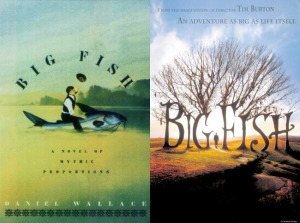
3. Grief is the Thing with Feathers by Max Porter
“I am your Ted’s song-legend, Crow of the death-chill, please. The God-eating, trash-licking, word-murdering, carcass-desecrating math-bomb motherfucker, and all that.”
Crows are a curious bird – a creature laden with mythology and literary significance. And that’s the role it plays as a representation of grief and hope in this aesthetically challenging, emotionally charged book. Like Big Fish, this one draws upon fairy tale to sift through key themes of loss, heartache, healing, growth, though it’s hard to call it a novel. Porter plays with structure and form so parts are fable-like prose, parts allusion-heavy poetry, parts spirited meditation on grief. Why is it on this list? Because Porter’s perspective on how grief manifests as many ‘things’ (a deliberate reference back to Emily Dickinson’s famous “Hope Is The Thing With Feathers”) is one of the most funny, warm and wild reflections on how the living must continue after bereavement. Likewise Crow takes on many forms – shape shifts and dallies in the metaficitional space of those trying to understand their grief but remains feathery-light and mischievous – much like our emotions after loss. It’s probably not a book everyone will love. Some will find it needlessly disobedient as a text and elliptical in its storytelling. But if you’re a fan of the unusual then this is one of the most vital pieces of writing I can recommend.
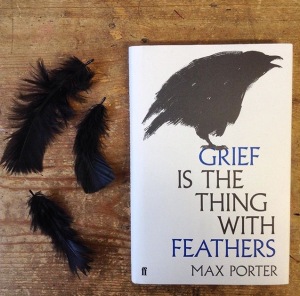
4. The Bell Jar by Sylvia Plath
“Death must be so beautiful. To lie in the soft brown earth, with the grasses waving above one’s head, and listen to silence. To have no yesterday, and no tomorrow. To forget time, to forgive life, to be at peace.”
It’s nearly ten years since I first read The Bell Jar and it remains one of the most haunting books on my shelf to this day. Sylvia Plath’s pseudo-autobiographical novella is one of her most enduring and intense pieces of writing, depicting the protagonist, Esther Greenwood, as she descends into mental distress, depression and anxiety. Crisp, precise language carries the novel through some of the most painful experiences of a young woman’s life, but conveys how story again bridges that space life and fear of the unknown. Like its author, The Bell Jar is preoccupied with death and its discussions are characterised by anxiety. Death imagery, from the outset is prevalent – there’s an early scene where Esther’s leans her elbow on a cadaver whilst her friend Buddy dissects it – yet what becomes most apparently is that it’s as much about life as it is death. It is not a happy novel but it is a poetic consideration of the desire to live, the horror of existing, and the power of death in providing perspective over our stories.
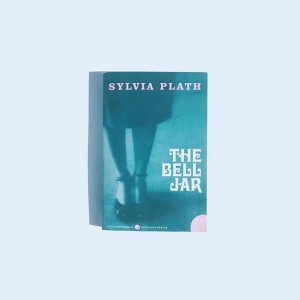
5. A Brief History of Seven Killings by Marlon James
“Woman breed baby, but man can only make Frankenstein.”
Profane, savage, astonishing, and winner of the Man Booker 2015 and the American Award 2015, Marlon James’ third novel is a markedly different book to the rest on this list. Taking 1970s Jamaica as the backdrop and the attempted shooting of Bob Marley as the cornerstone, A Brief History imagines the lives of the would-be-assassins after the event. The central conceit, alluded to in the first chapter narrated by a ghost, offers a thin veil between real and imagined history. And the multiple voices used throughout evokes a linguistic violence to match that of the story. It is a novel about survival. A novel that treats individual deaths as an opportunity to rewrite – or at least question – life and society. The nihilism of the characters is therefore poignant. This isn’t a book that makes you question why or gives answers to what or where, but it does beggar an opinion on how we live and die.
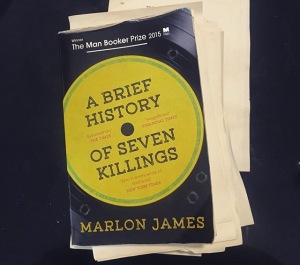
6. The Graveyard Book by Neil Gaiman
““Name the different kinds of people,’ said Miss Lupescu. ‘Now.’ Bod thought for a moment. ‘The living,’ he said. ‘Er. The dead.’ He stopped. Then, ‘… Cats?’ he offered, uncertainly.”
Children’s literature has always been full of death and whilst it took me some time to read this much-acclaimed novel by Neil Gaiman, it’s absolutely worth plucking of the shelf. Telling the story of a boy, Nobody ‘Bod’ Owens, who is adopted the supernatural occupants of a graveyard after a mysterious assassin murders his family, The Graveyard Book is at once dark, humorous, delightful and scary. I’ve included it here mainly because of the wonderful way Gaiman renders the characters of the deceased, from Bod’s graveyard parents to his ghost teacher. However, it’s also worth a read for the mythology of the dead. In typical Gaiman fashion, the novel is loaded with ghost story allusions and inventive imaginings of how a very-much-alive child might grow-up alongside the deceased. In this way, the story also tells a very important message: don’t be afraid of death, befriend it, forget about it, and then live your life. Because whilst alive we’re full of “infinite potential. You can do anything, make anything, dream anything. If you can change the world, the world will change. Potential.”
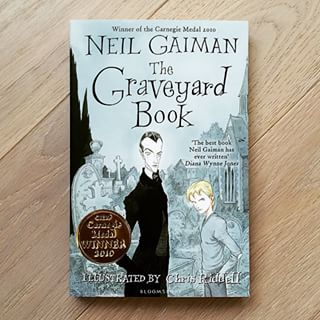
7. The Book Thief by Marcus Zusak
““I wanted to tell the book thief many things, about beauty and brutality … I wanted to explain that I am constantly overestimating and underestimating the human race-that rarely do I ever simply estimate it. I wanted to ask her how the same thing could be so ugly and so glorious, and its words and stories so damning and brilliant.”
It would be remiss on any list of novels about death to exclude this beautiful, heartbreaking novel by Marcus Zukas. Set in Nazi Germany and narrated by Death itself, this is the kind of book that can be life-changing. Certainly, I know that I finished the last page a different person to the one who turned the first. Why? Because in having Death tell the story of Liesel, Zusak shows how each person can embody life, hope and vitality. But he never denies that there is a natural order beyond our human comprehension, never shies from the fact that Death is more often unsentimental, grim, and amoral. Again, there’s the common trope that values stories – the importance of books and narratives that make sense of hardship and loss and life. In many ways it is a treatise on fate, on chance. And the writing is gorgeous – philosophical but never heavy, elegant but never pretentious. Read this slowly. Savour it. But don’t forget the tissues.
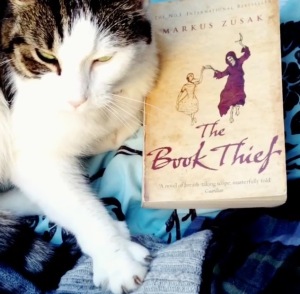
Leave a comment